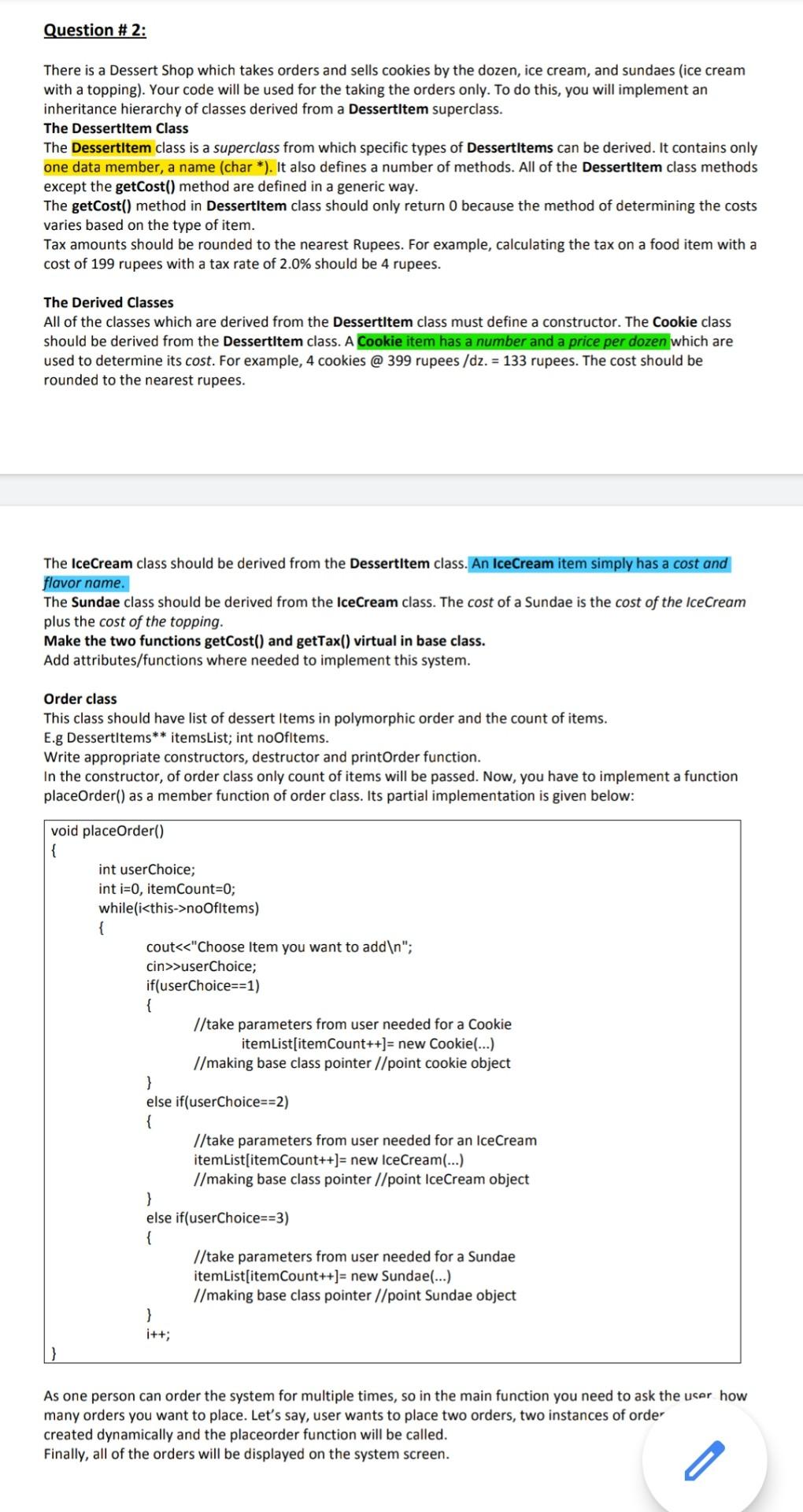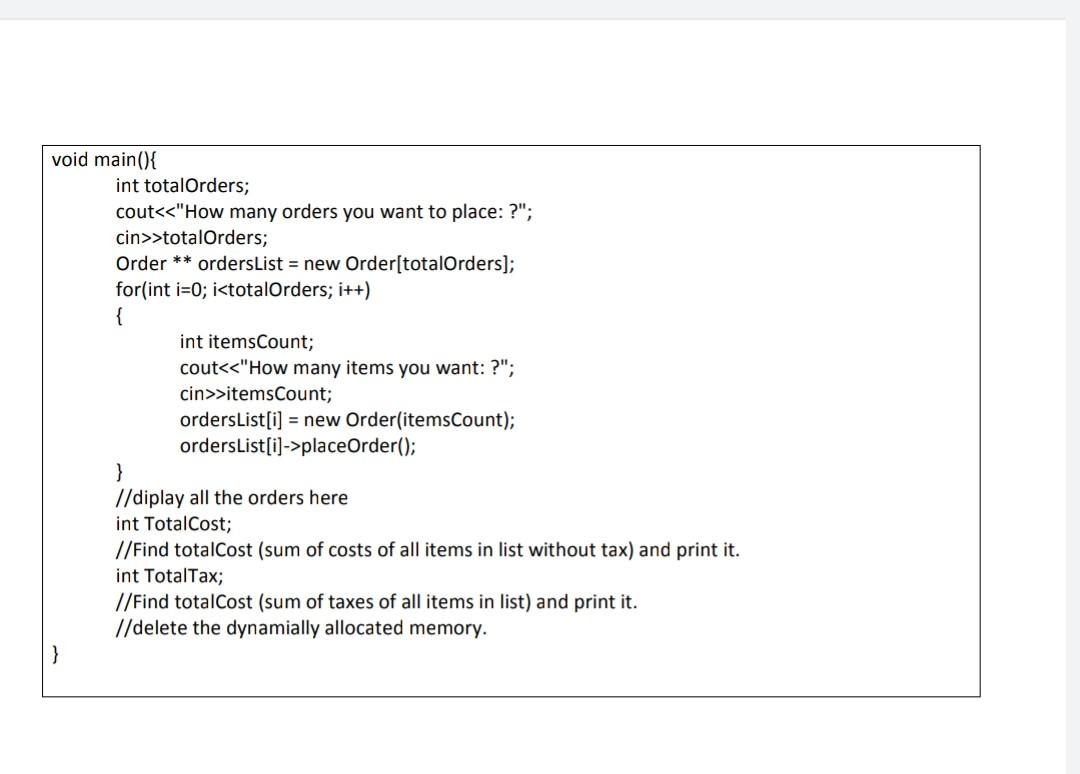Do it in c++ using oop techniques.
Question # 2: There is a Dessert Shop which takes orders and sells cookies by the dozen, ice cream, and sundaes (ice cream with a topping). Your code will be used for the taking the orders only. To do this, you will implement an inheritance hierarchy of classes derived from a Dessertitem superclass. The Dessertitem Class The Dessertitem class is a superclass from which specific types of Dessertitems can be derived. It contains only one data member, a name (char *). It also defines a number of methods. All of the Dessertitem class methods except the getCost() method are defined in a generic way. The getCost() method in Dessertitem class should only return 0 because the method of determining the costs varies based on the type of item. Tax amounts should be rounded to the nearest Rupees. For example, calculating the tax on a food item with a cost of 199 rupees with a tax rate of 2.0% should be 4 rupees. The Derived Classes All of the classes which are derived from the Dessertitem class must define a constructor. The Cookie class should be derived from the Dessertitem class. A Cookie item has a number and a price per dozen which are used to determine its cost. For example, 4 cookies @ 399 rupees /dz. = 133 rupees. The cost should be rounded to the nearest rupees. The IceCream class should be derived from the Dessertitem class. An IceCream item simply has a cost and flavor name. The Sundae class should be derived from the IceCream class. The cost of a Sundae is the cost of the IceCream plus the cost of the topping. Make the two functions getCost() and getTax() virtual in base class. Add attributes/functions where needed to implement this system. Order class This class should have list of dessert Items in polymorphic order and the count of items. E.g Dessertitems** itemsList; int noOfitems. Write appropriate constructors, destructor and printOrder function. In the constructor, of order class only count of items will be passed. Now, you have to implement a function placeOrder() as a member function of order class. Its partial implementation is given below: void placeOrder() { int userChoice; int i=0, itemCount=0; while(i
noOfitems) { cout>userChoice; if(userChoice==1) { //take parameters from user needed for a Cookie itemList[itemCount++]= new Cookie(...) //making base class pointer //point cookie object } else if(userChoice==2) { //take parameters from user needed for an IceCream itemList[itemCount++]= new IceCream(...) //making base class pointer //point IceCream object } else if(userChoice==3) { //take parameters from user needed for a Sundae itemList[itemCount++]= new Sundae...) 1/making base class pointer //point Sundae object } i++; As one person can order the system for multiple times, so in the main function you need to ask the user how many orders you want to place. Let's say, user wants to place two orders, two instances of order created dynamically and the placeorder function will be called. Finally, all of the orders will be displayed on the system screen. void main(){ int totalOrders; cout>totalOrders; Order ** ordersList = new Order(totalOrders); for(int i=0; i>itemsCount; orders List[i] = new Order(itemsCount); orders List[i]->placeOrder(); } //diplay all the orders here int TotalCost; //Find totalCost (sum of costs of all items in list without tax) and print it. int TotalTax; //Find totalCost (sum of taxes of all items in list) and print it. //delete the dynamially allocated memory. Question # 2: There is a Dessert Shop which takes orders and sells cookies by the dozen, ice cream, and sundaes (ice cream with a topping). Your code will be used for the taking the orders only. To do this, you will implement an inheritance hierarchy of classes derived from a Dessertitem superclass. The Dessertitem Class The Dessertitem class is a superclass from which specific types of Dessertitems can be derived. It contains only one data member, a name (char *). It also defines a number of methods. All of the Dessertitem class methods except the getCost() method are defined in a generic way. The getCost() method in Dessertitem class should only return 0 because the method of determining the costs varies based on the type of item. Tax amounts should be rounded to the nearest Rupees. For example, calculating the tax on a food item with a cost of 199 rupees with a tax rate of 2.0% should be 4 rupees. The Derived Classes All of the classes which are derived from the Dessertitem class must define a constructor. The Cookie class should be derived from the Dessertitem class. A Cookie item has a number and a price per dozen which are used to determine its cost. For example, 4 cookies @ 399 rupees /dz. = 133 rupees. The cost should be rounded to the nearest rupees. The IceCream class should be derived from the Dessertitem class. An IceCream item simply has a cost and flavor name. The Sundae class should be derived from the IceCream class. The cost of a Sundae is the cost of the IceCream plus the cost of the topping. Make the two functions getCost() and getTax() virtual in base class. Add attributes/functions where needed to implement this system. Order class This class should have list of dessert Items in polymorphic order and the count of items. E.g Dessertitems** itemsList; int noOfitems. Write appropriate constructors, destructor and printOrder function. In the constructor, of order class only count of items will be passed. Now, you have to implement a function placeOrder() as a member function of order class. Its partial implementation is given below: void placeOrder() { int userChoice; int i=0, itemCount=0; while(inoOfitems) { cout>userChoice; if(userChoice==1) { //take parameters from user needed for a Cookie itemList[itemCount++]= new Cookie(...) //making base class pointer //point cookie object } else if(userChoice==2) { //take parameters from user needed for an IceCream itemList[itemCount++]= new IceCream(...) //making base class pointer //point IceCream object } else if(userChoice==3) { //take parameters from user needed for a Sundae itemList[itemCount++]= new Sundae...) 1/making base class pointer //point Sundae object } i++; As one person can order the system for multiple times, so in the main function you need to ask the user how many orders you want to place. Let's say, user wants to place two orders, two instances of order created dynamically and the placeorder function will be called. Finally, all of the orders will be displayed on the system screen. void main(){ int totalOrders; cout>totalOrders; Order ** ordersList = new Order(totalOrders); for(int i=0; i>itemsCount; orders List[i] = new Order(itemsCount); orders List[i]->placeOrder(); } //diplay all the orders here int TotalCost; //Find totalCost (sum of costs of all items in list without tax) and print it. int TotalTax; //Find totalCost (sum of taxes of all items in list) and print it. //delete the dynamially allocated memory








